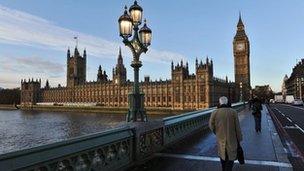West Lothian Question commission members announced
- Published

The six-strong panel will start discussing the West Lothian Question next month
The UK government has announced the panel of experts who will look at issues raised by the so-called West Lothian Question.
The commission will be chaired by former House of Commons clerk Sir William McKay.
There has been a long-running debate about whether Scottish, Northern Irish and Welsh MPs should vote on legislation that affects only England.
The commission has been tasked with recommending new ground rules.
The five other members of the panel are:
senior parliamentary lawyer Sir Stephen Laws
his predecessor in the role, Sir Geoffrey Bowman
the head of social and political science at Edinburgh University, Professor Charlie Jeffery
a leading researcher in gender politics from Queen's University Belfast, Professor Yvonne Galligan
and the UK's former ambassador to the UN, Sir Emyr Jones Parry, who chaired a review of the governance of Wales.
The terms of reference of the commission, which will begin its work next month, are: "To consider how the House of Commons might deal with legislation which affects only part of the United Kingdom, following the devolution of certain legislative powers to the Scottish Parliament, the Northern Ireland Assembly and the National Assembly for Wales."
Responding to the announcement on the make-up of the panel, the SNP's Constitutional Affairs spokesperson, Pete Wishart, expressed regret that none of the members had direct experience of devolved administrations.
Mr Wishart has also asked whether the commission would consider independence in Scotland as a solution to the West Lothian Question.
He said: "There is only one clear answer to the West Lothian Question and that is for both Scotland and England to be fully in charge of their affairs by becoming independent and equal nations - that is the best and fairest solution and one that the commission should be able to consider.
"SNP MPs already refrain from voting on exclusively English, Welsh and Northern Irish matters, which do not impact on Scotland.
"This self-denying ordinance stands in stark contrast to Labour, Lib Dem and Tory MPs who, to date, have been happy to impose their will on the other nations of the UK."
Shadow Secretary of State for Scotland, Margaret Curran, said she believed it was not right to create "second-class MPs" based on "which part of the UK they come from, or because they come from Scotland".
'Operates together'
She added: "To understand this issue properly, we need to understand the nature of devolution.
"Every person elected to the House of Commons has a responsibility not just to their constituents, but to the UK as a whole.
"That is a fundamental principle of devolution that decisions are taken in the right places to reflect our different nations that make up the UK, but that our House of Commons operates together as a country. It strengthens Scotland and I think it strengthens the whole UK."
An attempt to answer the West Lothian Question was part of the coalition agreement, but it was not until September last year that the UK government announced details of a promised commission.
The question was first posed when the Labour government tried unsuccessfully to introduce devolution in Scotland in the 1970s.
Labour MP Tam Dalyell, whose constituency at the time was West Lothian, wondered how long English MPs would tolerate members from Scotland, Wales and Northern Ireland exercising an important effect on English politics while they themselves had no say in the matters outside England.
Since the devolution of powers to the Scottish Parliament in 1999, and to the Northern Irish and Welsh assemblies, the West Lothian question has frequently returned to the fore.
- Published16 January 2012
- Published17 January 2012
- Published17 January 2012
- Published8 September 2011